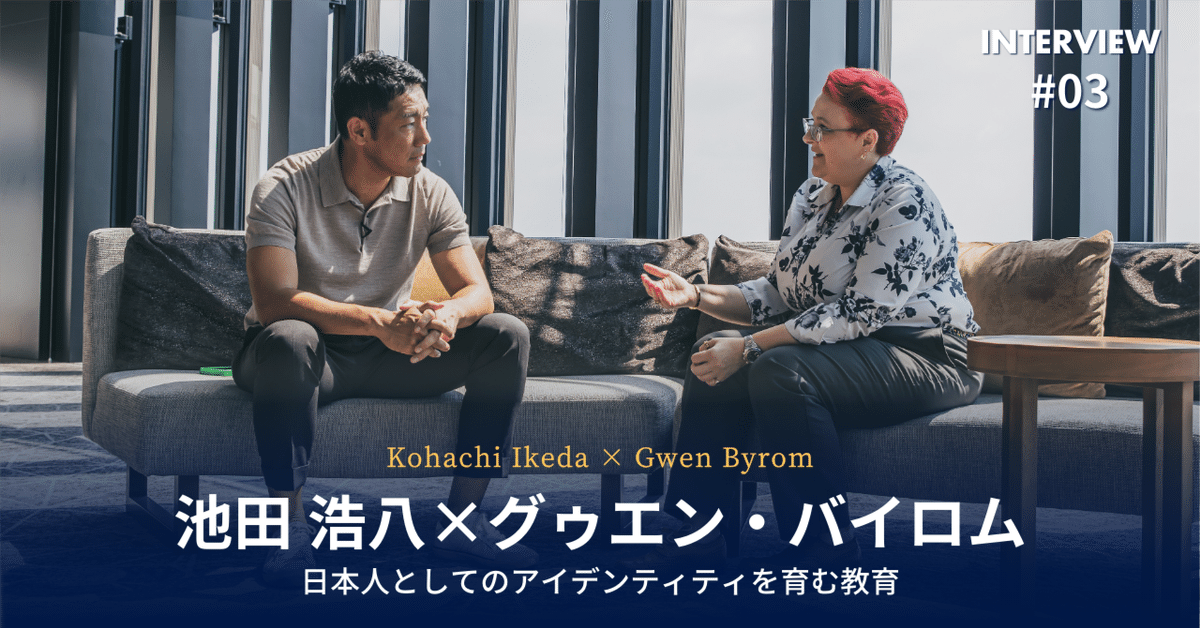
日本人としてのアイデンティティを育む教育
【English follows Japanese.】
インターナショナルスクール「North London Collegiate School Kobe(NLCS Kobe)」の池田浩八代表と、NLCS 海外校 教育戦略ディレクターのGwen Byrom(グゥエン・バイロム)さんによる対談の最終章。これまで、NLCS日本校第1号に神戸・六甲山が選ばれた理由について、NLCSの教育方針についてお話していただきましたが、最後の議題は、浩八代表がグローバル人材を育てる上で大切にしていることの一つでもある「日本人のアイデンティティについて」です。将来世界で活躍する日本の子供たちに、自分たちのバックグランドである日本についてどのように教え、日本人としてのアイデンティティをどのように育んでいくのか、お二人に話を聞きました。
↓前回の記事はこちら
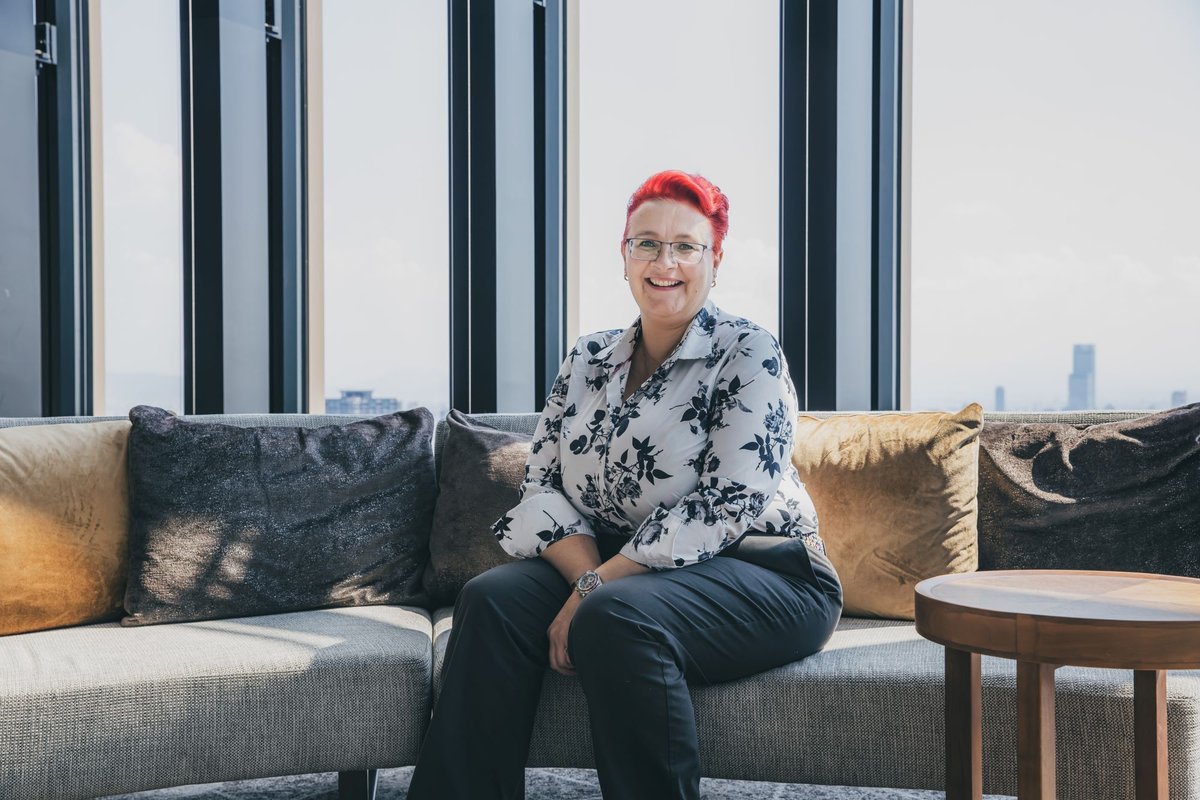
NLCS 海外校 教育戦略担当。マンチェスター大学にて理学士号、ロンドン大学ゴールドスミス校でPGCE(教育修士資格)、および教育学の修士号を取得。その後イギリス名門校 で副校⻑・校⻑代理などの重役を果たすなど、教育部門で20年以上の輝かしい経歴を持つ。現在、NLCSグループの教育戦略ディレクターを務める。
自分の国の文化や伝統を理解することが重要
池田浩八代表(以下、浩八代表):僕は前回もお話した通り、今後世界で活躍する子供たちにとって、言語を話せることだけではなく、日本人という確固たるアイデンティティを持って活躍できることが重要と考えています。
グゥエン・バイロム(以下、グゥエン):私も、インターナショナルスクールに通い、海外で勉強したり働いたりする子供たちにとって、自分自身のアイデンティティを失わないようにすることが大きな課題だと思っています。インターナショナルスクールに通う生徒は、“日本人でもないし、外国人でもない”と感じている子供が多いです。そのため、彼らは少し迷子になり、どこからも切り離されているように感じてしまうのです。自分の国の文化や伝統を理解することは本当に重要で、これは自分自身を認識することにつながっています。私たちは日本の子供たちに、世界における自分たちの立場と日本における自分たちの立場を理解できるように教育したいと考えています。
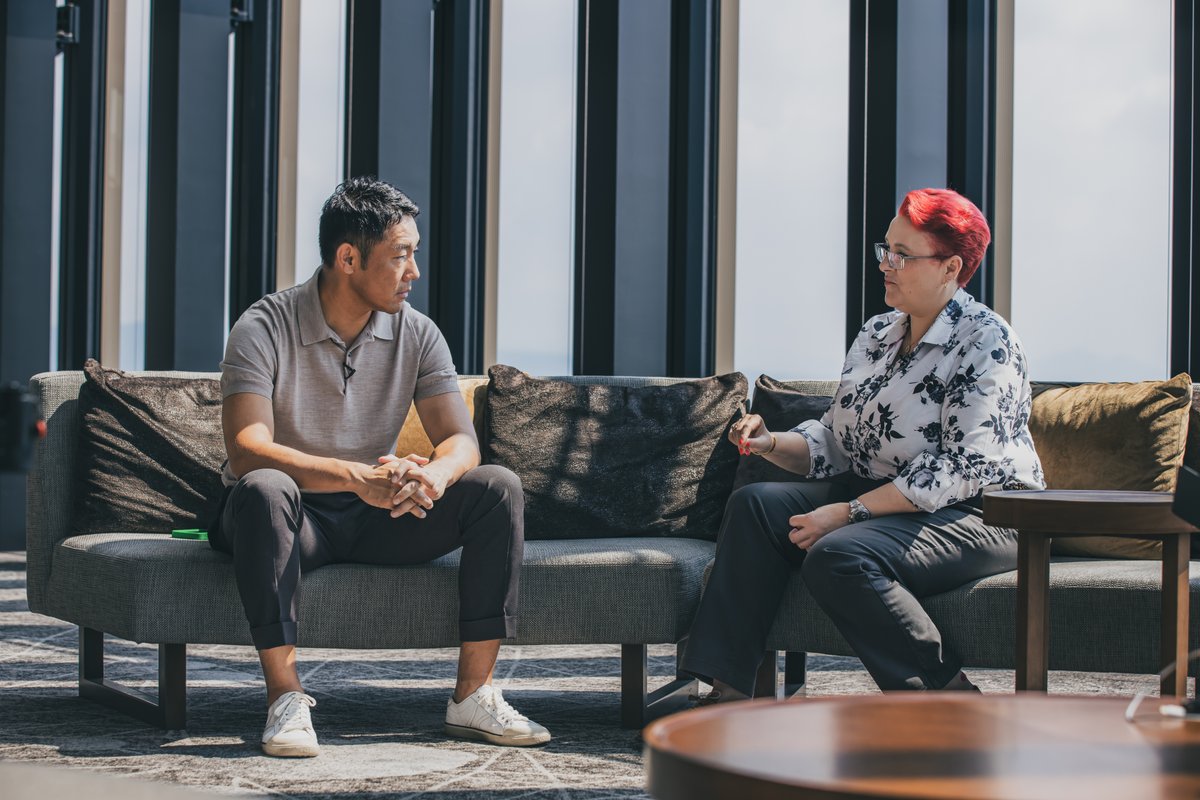
浩八代表:NLCS Kobeでは、 NLCSのカリキュラムをベースに、茶道や禅、礼法など “日本のことを教える”日本独自のカリキュラムを導入しようと思ったのも、日本の伝統文化の素晴らしさを知ってほしいからです。日本の伝統的なものを新しい解釈でもいいので学んで知るということが大切だと思っています。グゥエンさんは、日本人のアイデンティティについてどう感じていらっしゃいますか?
グゥエン:私自身、日本文化についてはまだ未熟なので認識が間違っているかもしれませんが、日本人のアイデンティティは、自然への尊敬、コミュニティへの尊敬、自分の世界を作るために使われるすべてのものへの感謝、お互いを支え合い協力し合うことで成功するという感覚から生まれているものだと思っています。以前、浩八さんと仏教について話したときも、自分らしくあることはもちろん、自分がみんなに与える影響力も意識する重要性を共有しました。
浩八代表:私が特に感じているのが、日本人のコミュニケーション能力。コミュニティの中にいると、自分の意見をどんどん言える人が話を進めますが、意見を言ってない人がどう考えてるのか、同意してるのか…。すごく相手の顔色やその場の空気を読みながら話すというのが、日本人の特徴の一つだと思っています。それは日本人の得意なこととも言えますが、世界中の人たちと一緒に仕事をしたり、生活をしたり、コミュニティの中に入っていくときには、その意見を言えない部分がどうしてもマイナスになるのかなと感じています。
グゥエン: それは大きな課題です。学校はみんながお互いをサポートしてこそうまく機能するコミュニティ。しかし、私たちは生徒全員に、コミュニティに対する敬意とサポートのバランスを見つけながら、自信を持って恐れずに意見を述べ、他の人の意見に耳を傾けることこそが、発信力のある人だと感じられるように教育したいと考えています。
そして、NLCSのすべての学校では、生徒は発言権を持ち、学校での活動に貢献し、リーダーシップを発揮し、教師に「なぜ?」「どのように?」と、もっとたくさん質問してくれることを期待しています。これはグローバルな世界で生きていく上でとても重要なスキルですが、攻撃的にならないようにうまくやることが大切であり、誰にとっても最善の結果をもたらす方法、道を見つけることが大事です。それを実現しようとすれば、まずは誰もが発言権を持ちつつも相手を思いやりながら楽しく発信することですね。
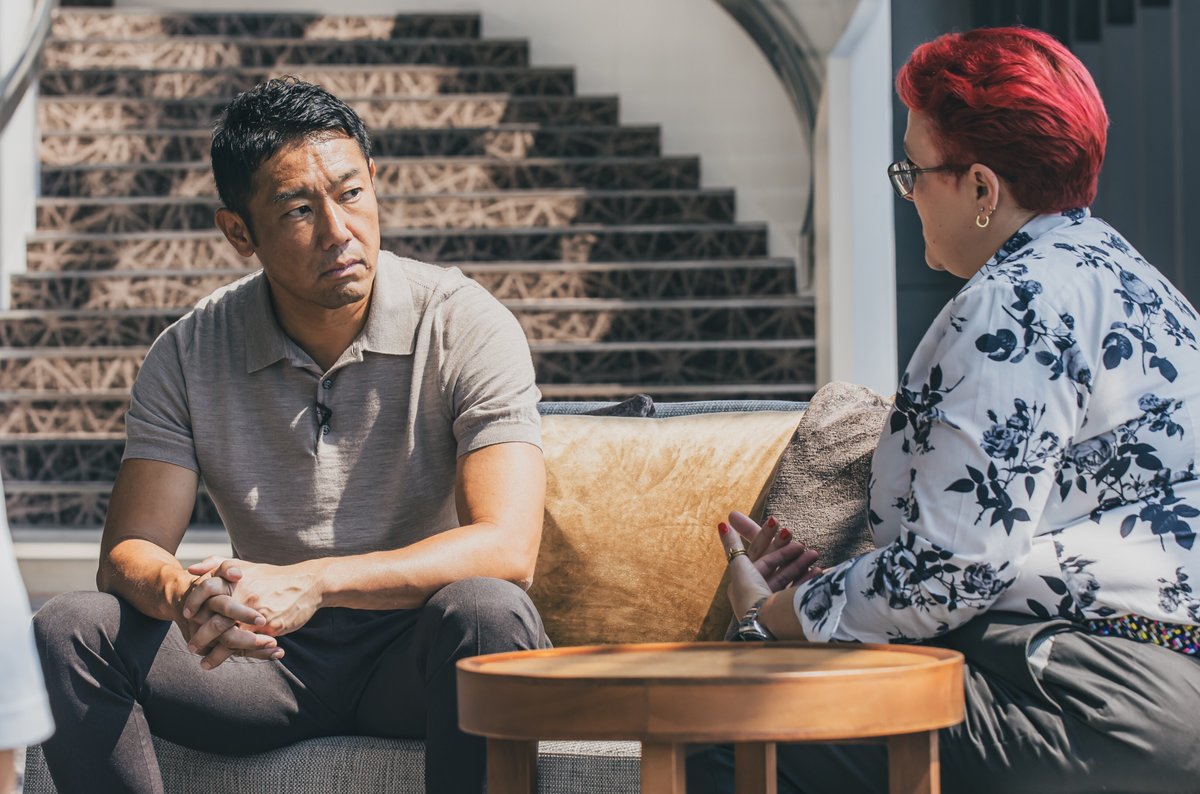
質問をすること、間違いを恐れない
創造的思考力を高める教育
浩八代表:質問することってとても大事ですよね。 僕自身が日本で受けてきた教育や育ってきた環境では、「覚える」「習う」というワンウェイのことが多くて、あまり質問をされなかったんですよね。「あなたはどういう人なの?何者なの?何がしたいの?何を表現したいの?」ということをあまり聞かれた記憶がなくて。 それがのちに大人になってから、自分が何をしたいのかわからなくなって壁にぶちあたる瞬間がたくさんありました。子供たちがこれから世界で活躍しようと思うと、早い段階からいろんな質問を教師に投げかけ、教師もそれを受け止めることができる、そうやって子供たちが自ら考えて表現するということが大事になってくるのかなと思っています。
グゥエン:そうですね。また、多くの学校では、教師に対する敬意も大きな課題となっています。生徒の中には、質問したくない、質問するのが怖いと感じる人もいます。間違ったことを言ってしまうのではないかと心配したり、教師に逆らってはいけないと感じているからです。なので私たちは生徒たちに、質問をすること、間違いを恐れないことを彼らが理解しやすいように教えます。大切なのは、事実を覚えるだけではありません。その事実を”どう使うか”、”どう組み合わせてさらに違うものを作るか”です。たくさんの事実を学ぶことは良いことですが、創造的思考を知らなければ、何も前進できません。
浩八代表:生徒たちはすごく教師を見ていますよね。教師が生徒たちに問いかけるのであれば、 教師も自分のことを話すとか、教師同士が学校の中でいろんな質問をし合うとか、そういうところを見せることで子供たちにとってもそれが当たり前になっていくのだと思います。
グゥエン:その通りです。大人の教師にとって「ごめんなさい、それは間違っていました」と言うのは難しいかもしれませんが、生徒たちには間違ってしまうことがあるということを伝えてもらいたいと思っています。教師には、教えている教科について学び続け、それを生徒たちと共有することを奨励しています。そうすることで、教師たちは自分が学んでいることや、教科について興味のあることについて自然と話すようになります。生徒たちは、教師が学んでいること、学ぶこと自体が素晴らしく、それが贈り物であることを知ることができます。大学を卒業して就職したら必要以上のことは学ばなくていいと考えるのではなく、生涯学び続けてほしいのです。教師たちには知識や新しいことに貪欲であってほしいなと思っています。
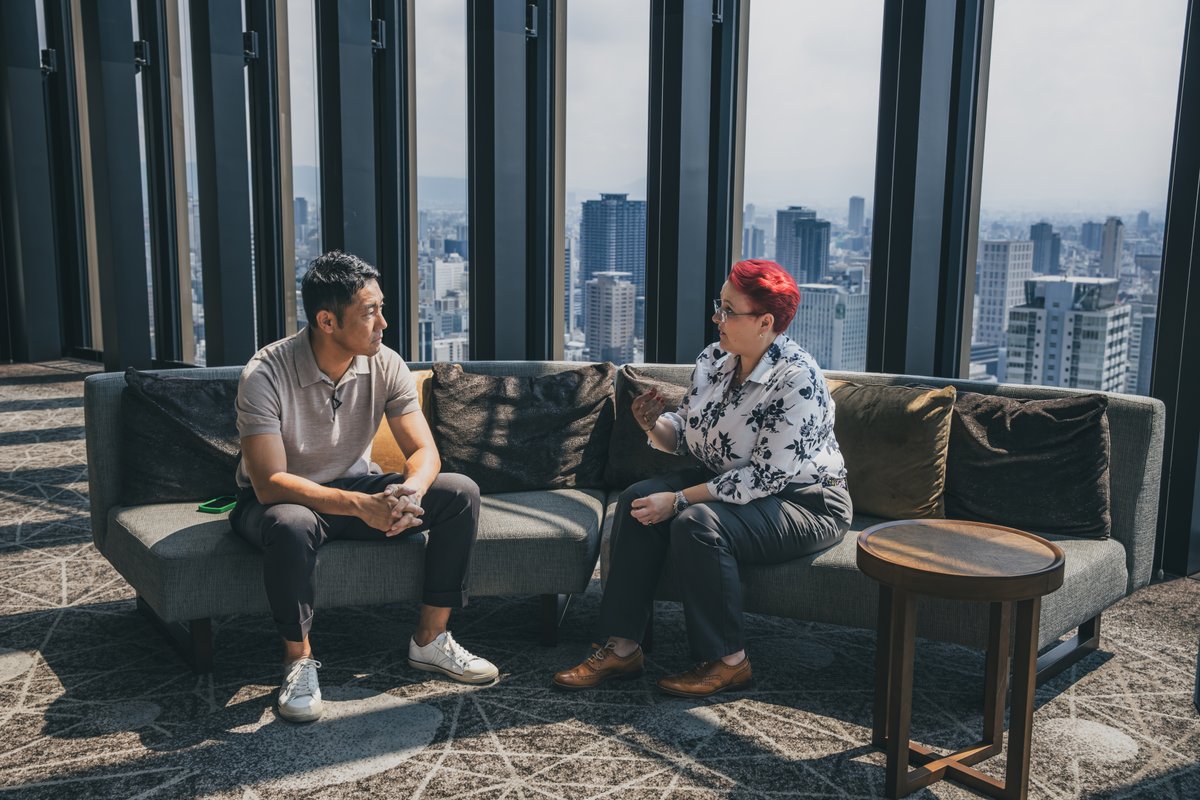
子供たちとの時間を心から楽しみ
思いやりを持って接すること
浩八代表:そのような教師の育成はどのようにしていくのでしょうか?
グゥエン:私はNLCSすべての海外校の校長と連携しており、NLCSが求めている教師の特徴をよく理解しています。NLCS Kobeの校長として面接したマット(マシュー・ウィリアムズ)にも「現在の学校に教師を任命する際に何を求めているか」を尋ねました。マットが私と同じ考え方を持っているかどうかを確認したかったからです。
私たちは熱意があり、学校で働くことにワクワクし、自分の教科についてもっと知りたいと思っている人をNLCSの教師として求めています。私たちの生徒は試験で驚くほど良い成績を収めていますが、試験に合格する方法を教えているわけではありません。試験に合格するだけではダメで、何を学んでいるのかを理解する必要があります。試験で出題されるどんな問題にも対処できるように、教科に興味を持たせます。なので教師はみんな、自分の教科にとても熱心に取り組んでいます。
そして、私はNLCSすべての学校で任命する教師と個人的に面接しています。昨年は約1万2,000人の応募の中から約170人の面接を担当しました。その学校の校長とスタッフだけでなく、NLCSの担当者がすべての教師と会うことで、この人が適任だと言えるようになります。彼らが仕事を始める前に、私たちは彼らを3日間ロンドンに連れて行き、NLCSの教育方針、私たちがどのように協力し合うか、私たちが彼らに何を期待しているかについて話し合います。教師たちに優れた教育が何を意味するのかを伝え、彼らが実際に子供たちに教えるときにそれを再現できるようにしています。
浩八代表:僕はこれまで教師はすでにたくさんの知識を持っており、それを生徒たちに教えているというイメージで、出来あがった知識をアウトプットしていると思っていたのですが、自分がいざ大人になってみると、アウトプットするためには大量のインプットが必要だとすごく感じています。それは教師だけでなく、すべての大人に当てはまることです。新しいインプットが良きアウトプットに繋がり、良いものを作り出すと感じてます。ですから教師も間違いをするし、トラブルを経験することもあるというのはどんどん伝えて欲しいですよね。子供たちにとって、そうしたこと全てが学びになりえると感じます。
グゥエン:教師にとって、教えることは教科書に書いてあるので、それさえあれば安心できるし、考える必要もない。過去何十年も同じことをしてきたから、と教科書の内容を教えるのは簡単なことです。でも、そうではなくて、私たちは生徒たちに望むのと同じ熱意を教師にも持ってもらいたいと思っているので、NLCSの教師には熱意のある方しか採用していません。
また、彼らがいい大学に通っていたことは、“いい教師”であるかどうかの指標ではありません。一部の学校では「私たちの教師全員が修士号と博士号を持っている」と主張します。でも、子供たちときちんと向き合うことができなければ、それは意味がありません。なので私たちは教師が子供たちとしっかりと向き合い、子供たちと過ごす時間を心から楽しむことを望みます。
もう一つ、私たちが求めることは、すべての教師が生徒をサポートし、思いやりを持って接すること。学ぶことはもちろん重要ですが、生徒が幸せで心地よく、支えられていると感じ、自分のありのままの姿を受け入れてくれていると感じなければ、成功は得られません。生徒が幸せで、自分自身に満足し、学習や成功、夢を持つことの妨げとなるものがないように、できる限りのことをするよう努めたいと思っています。そのためには、教師たちが教育とは自分一人の仕事ではなく、教師全員の仕事であることを理解することがとても重要だと感じています。
池田浩八代表、グゥエンさん、どうもありがとうございました!
●HP https://nlcskobe.jp/
●Instagram https://www.instagram.com/nlcskobe/
●LinkedIN https://jp.linkedin.com/company/north-london-collegiate-school-kobe
Education that fosters Japanese identity
This is the final chapter of the conversation between Kohachi Ikeda, CEO, and Gwen Byrom, Education Strategy Director for North London Collegiate School (NLCS) International Schools. So far, they have talked about why Kobe Rokkosan was chosen as the location for the first NLCS Japan school and the NLCS educational policy, but the final topic is "Japanese identity," which is one of the things that Kohachi considers important in nurturing global talent. We spoke to the two about how they teach Japanese children who will be active on the world stage in the future about their background in Japan and how they foster their identity as Japanese people.
↓* Click here for the previous article.

It is important to understand the culture and traditions of your own country.
Kohachi Ikeda:As I mentioned last time, I believe that for children who will be active in the world in the future, it is important not only to be able to speak the language, but also to be able to thrive with a strong sense of identity as Japanese people.
Gwen Byrom:I also think that a big challenge for children who go to international schools and study or work abroad is to make sure they don't lose their own identity. Many students who go to international schools feel like they're neither "Japanese nor foreign." So they feel a bit lost and disconnected from everywhere. It's really important to understand the culture and traditions of your own country, and this is connected to self-awareness. We want to educate Japanese children to understand their place in the world and their place in Japan.
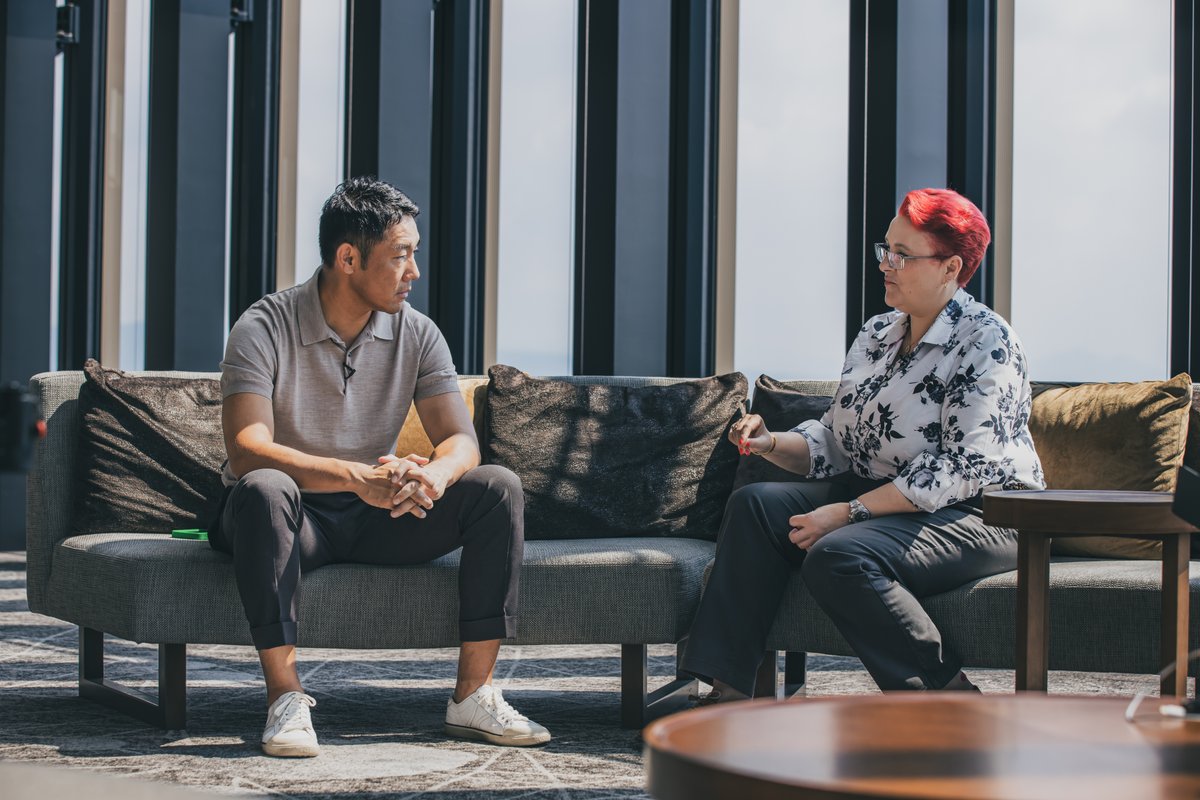
Kohachi:At NLCS Kobe, we decided to introduce a uniquely Japanese curriculum based on the NLCS curriculum, such as tea ceremony, Zen, and etiquette, to teach students about Japan, because we want them to know the beauty of traditional Japanese culture. We think it is important to learn and know traditional Japanese things, even if it is a new interpretation. How do you feel about Japanese identity?
Gwen:I myself am still inexperienced in Japanese culture, so my perception may be wrong, but I believe that Japanese identity comes from respect for nature, respect for community, gratitude for all that goes into creating our world, and a sense of success through supporting and cooperating with each other. When I spoke with Kohachi about Buddhism before, we shared the importance of being aware of the influence you have on others, as well as being true to yourself.
Kohachi:What I particularly feel is the communication ability of Japanese people. In a community, people who can express their opinions will move the discussion forward, but people who don't express their opinions will wonder what others are thinking, whether they agree... I think one of the characteristics of Japanese people is that they speak while reading the other person's facial expressions and the atmosphere of the situation. You could say that this is something Japanese people are good at, but when working and living with people from all over the world, or when joining a community, I feel that not being able to express one's opinions will inevitably be a disadvantage.
And in all NLCS schools, we expect students to have a voice, contribute to school activities, demonstrate leadership, and ask teachers more questions, such as "why?" and "how?" This is a very important skill for living in a global world, but it is important to do it well without being aggressive, and to find a way to get the best results for everyone. To achieve this, the first thing to do is for everyone to have a voice, but to be considerate of others and have fun speaking up.
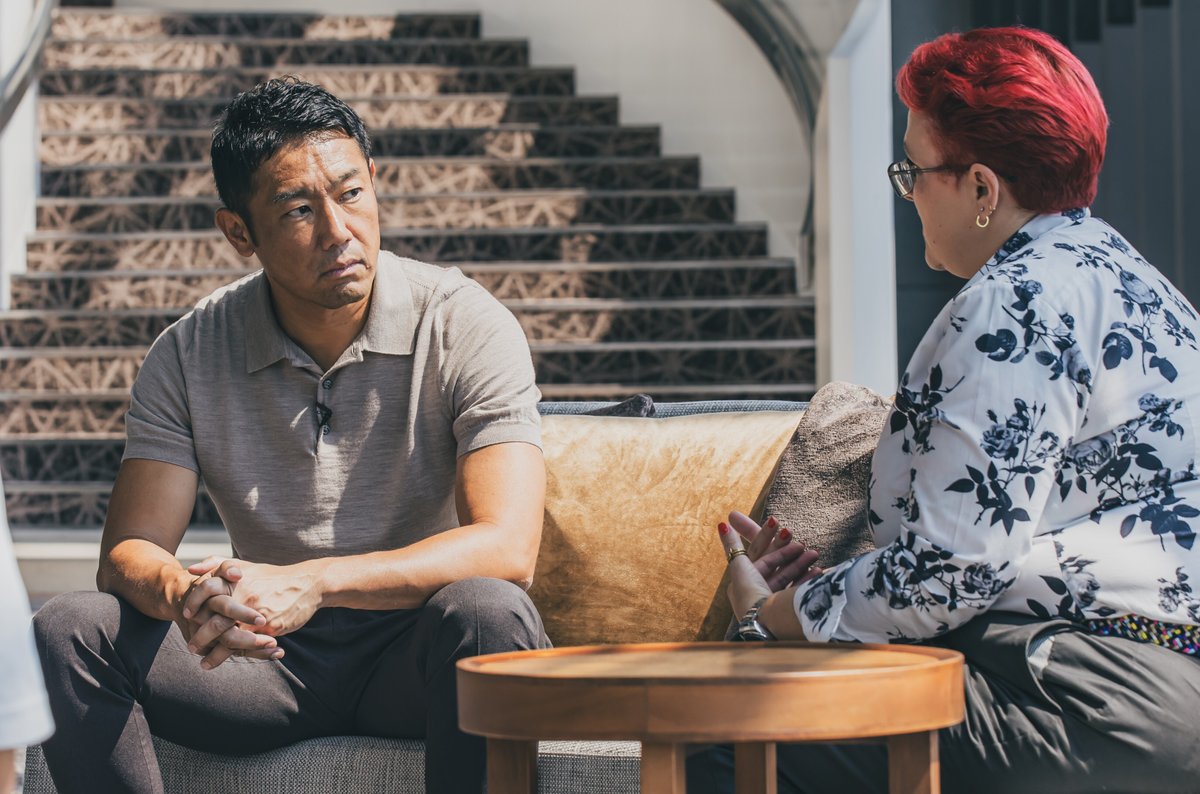
Education that encourages creative thinking by asking questions and not being afraid to make mistakes
Kohachi:Asking questions is very important. In the education I received in Japan and the environment I grew up in, it was mostly one-way, just learning and memorizing, and I wasn't asked many questions. I don't remember being asked much about "What kind of person are you? Who are you? What do you want to do? What do you want to express?" Later, when I became an adult, there were many moments when I didn't know what I wanted to do and I hit a wall. If children want to be active in the world in the future, I think it's important for them to ask their teachers various questions from an early stage, and for teachers to be able to accept them, so that they can think for themselves and express themselves.
Gwen:Yes. Also, respect for teachers is a big issue in many schools. Some students don't want to ask questions, they feel scared to ask questions because they are afraid of saying the wrong thing, or they feel they shouldn't go against the teacher. So we teach students to ask questions and not be afraid to make mistakes in a way that makes it easy for them to understand. It's not just about memorizing facts. It's about how to use those facts, how to combine them to make something different. Learning a lot of facts is good, but if you don't know how to think creatively, you won't get anywhere.
Kohachi:Students really look to their teachers. If teachers are asking students questions, it would be good for teachers to talk about themselves, or for teachers to ask each other various questions at school. By showing students this, I think it will become natural for them.
Gwen:That's right. It may be difficult for adult teachers to say, "I'm sorry, that was wrong," but I want students to know that it's possible to make mistakes. I encourage teachers to continue learning about the subjects they teach and share that with their students. This will naturally encourage teachers to talk about what they're learning and what interests them about the subject. Students will know that their teachers are learning, and that learning itself is wonderful and a gift. I want teachers to continue learning throughout their lives, rather than thinking that they don't need to learn more than they need to once they graduate from college and get a job. I want teachers to be greedy for knowledge and new things.
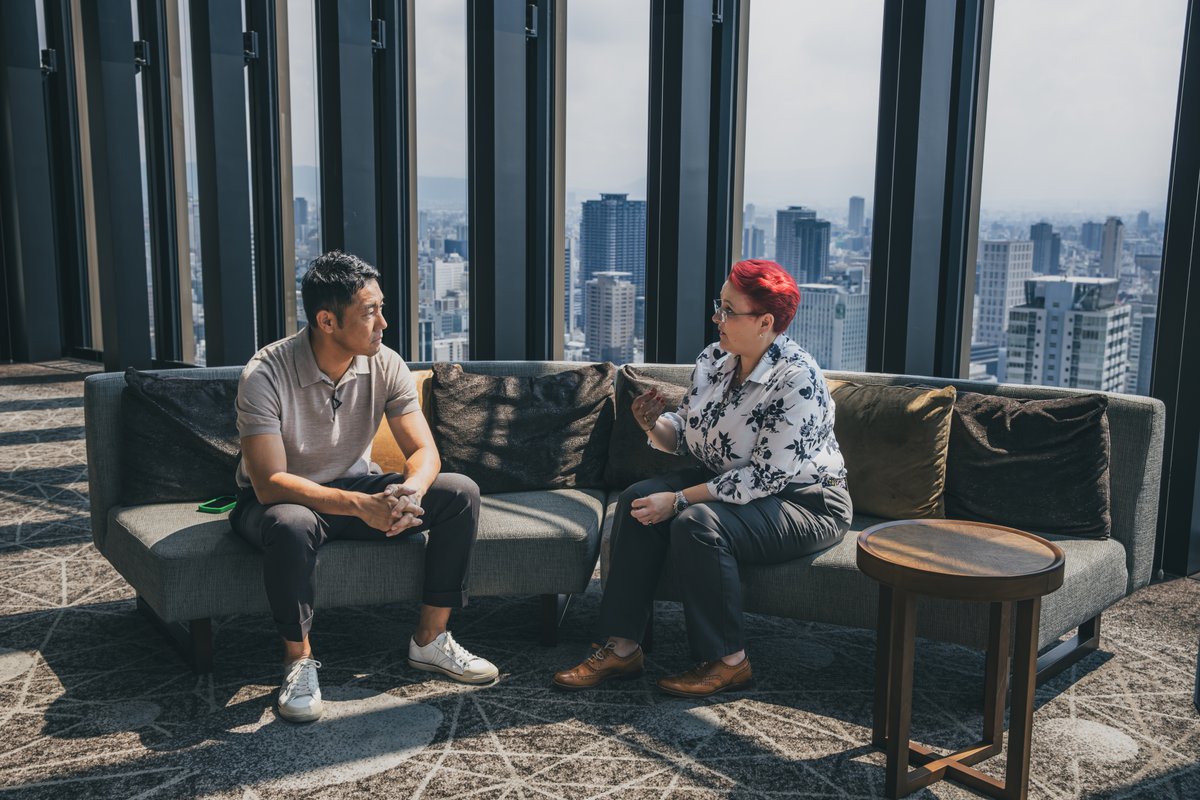
Enjoy spending time with your children and treat them with kindness
Kohachi:How do we train such teachers?
Gwen:I work with all the Principals of NLCS overseas schools, so I have a good understanding of the characteristics of teachers that NLCS is looking for. I also asked Matt (Matthew Williams), who I interviewed as the Principal of NLCS Kobe, "What do you look for when appointing a teacher to your current school?" because I wanted to make sure that Matt had the same mindset as me.
We look for NLCS teachers who are enthusiastic, excited to work in a school, and eager to learn more about their subject. Our students do amazingly well in their exams, but we don't teach them how to pass the exams. It's not enough to just pass the exam, you have to understand what you're learning. We make them interested in the subject so they can handle any problem that comes in the exam. So all our teachers are very passionate about their subject.
And I personally interview every teacher we appoint in every NLCS school. Last year, I interviewed about 170 people out of about 12,000 applicants. The principal and staff of the school, as well as NLCS personnel, meet with every teacher so that we can say this person is the right person. Before they start work, we take them to London for three days to talk about NLCS's teaching philosophy, how we will work together, and what we expect from them. We tell teachers what good teaching means so that they can replicate that when they actually teach children.
Kohachi:Until now, I thought that teachers already had a lot of knowledge and that they were teaching it to students, and that they were outputting the knowledge they had already acquired, but now that I'm an adult, I really feel that in order to output, a lot of input is necessary. This applies not only to teachers, but to all adults. I feel that new input leads to good output and creates good things. So I want teachers to keep telling us that teachers also make mistakes and experience trouble. I feel that all of these things can be a learning experience for children.
Gwen:For some teachers, what they teach is written in the textbook, so they feel at ease and don't have to think about it. It's easy to teach what's in the textbook because we've been doing the same thing for decades. But instead, we want our teachers to have the same enthusiasm that we want to see in our students, so we only hire enthusiastic teachers at NLCS.
Also, the fact that they went to a good university is not an indicator of whether they are "good teachers." Some schools claim that "all our teachers have master's degrees and doctorates." But it's meaningless if they can't face the children properly. So we want our teachers to face the children properly and truly enjoy the time they spend with them.
Another thing we expect is that all teachers are supportive and caring towards their students. Of course, learning is important, but if students don't feel happy, comfortable, supported, and accepted for who they are, they won't be successful. We want to try to do everything we can to make sure students are happy, feel good about themselves, and have no barriers to learning, succeeding, and dreaming. To achieve this, we feel it's very important for teachers to understand that education is not just their job, it's the job of all teachers to support and care for their students.
Thank you very much, President Kohachi Ikeda and Gwen Byrom!
●HP https://nlcskobe.jp/
●Instagram https://www.instagram.com/nlcskobe/
●LinkedIN https://jp.linkedin.com/company/north-london-collegiate-school-kobe
